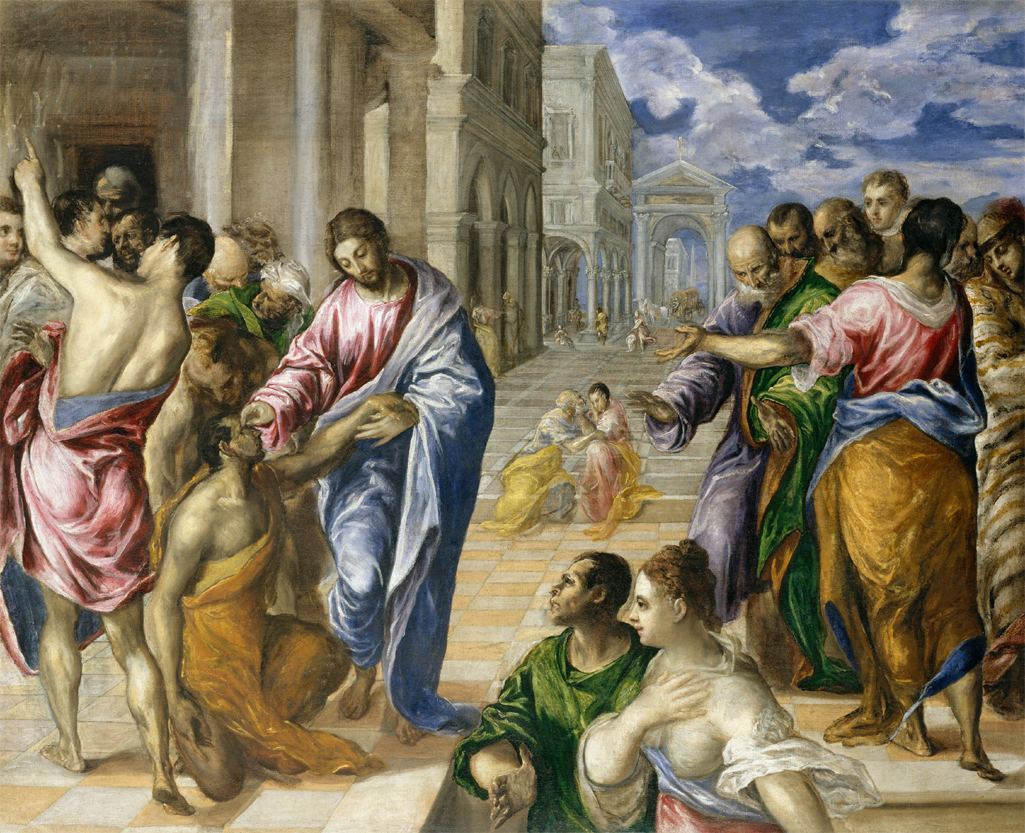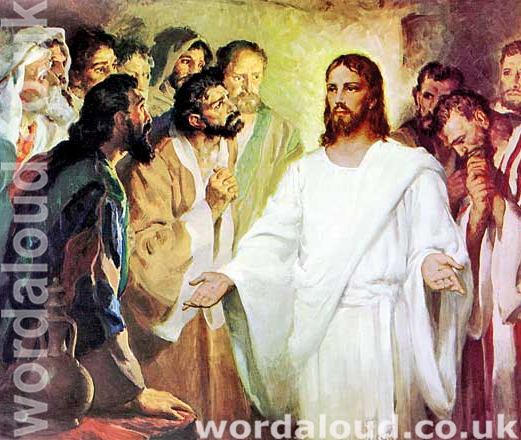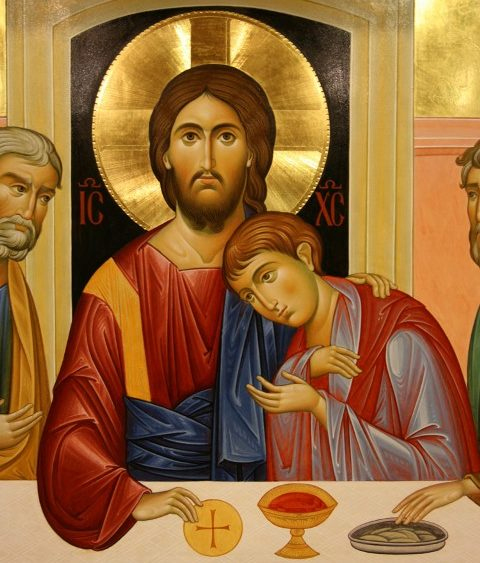Christian Art | Jesus As A Child
Office Of Readings | Week 12, Saturday, Ordinary Time | A Reading From The Homilies Of Saint Gregory Of Nyssa On The Beatitudes | God Can Be Found In Man’s Heart
‘God can be found in man’s heart.’
At the heart of Saint Gregory’s teaching is the conviction that the path to divine vision is not outward or abstract, but inward, practical, and moral.
Saint Gregory begins by contrasting superficial knowledge of God with actual participation in God’s life. It is not enough to know about God; we must come to possess Him inwardly. Drawing on the doctrine of the imago Dei (image of God), Gregory teaches that the divine image implanted within us at creation has been tarnished by sin. Yet this image is not destroyed—it can be restored. The human heart, when purified, becomes like a polished mirror capable of reflecting divine light.
Using the analogy of iron polished to brilliance after rust is scraped away, Gregory points to the transformative power of virtue. It is a lifelong task of cleansing our interior life from sin and disorder. When the ‘coating of filth’ is removed from the heart, we behold the divine beauty not as something alien but as something reflected in the renewed self. This is not mystical elitism but the Christian life as it should be: an ever-deepening conformation to Christ.
Scriptural Anchoring | God Within
Gregory draws on Christ’s teaching that ‘the kingdom of God is within you’ (Luke 17:21), suggesting that the journey to see God begins not in the heavens but in the heart. The beatitude from Matthew 5:8 is thus not a promise for a remote afterlife alone but an invitation to begin the beatific vision here and now through moral purification. In this reading, purity of heart is not an impossible ideal but the concrete goal of Christian life, sustained by grace and nurtured through prayer, sacraments, and ascetic effort.
Saint Gregory and the Philosophical Tradition
Gregory’s background in Neoplatonic thought emerges clearly in his metaphors and structure. Like Plotinus, he sees the soul’s destiny as returning to its divine source through purification. But unlike the Neoplatonists, Gregory insists that this return happens not through intellectual abstraction but through moral and spiritual transformation. For Gregory, virtue is the mirror in which we see God.
Moreover, he diverges from Platonism by locating God not in a distant realm of forms but within the purified soul. This Christian re-centring of divine presence affirms the dignity of the human person as a temple of the Spirit. The language of ‘seeing’ must thus be understood spiritually: to ‘see God’ is to perceive His goodness, truth, and beauty present within the self when it has been conformed to divine likeness.
Hope For Transformation
Gregory’s theology refuses despair. Even if the vision of God seems exalted and impossible, he insists it is attainable. Drawing analogies from Scripture (e.g., the purified iron), he affirms that human beings are capable of divine vision because God would not command what is impossible. This is a hopeful and realistic spirituality: the beatific vision is not reserved only for the saints of old, but is available to anyone who, by grace, cooperates with the work of purification.
His closing reflections are especially pastoral: when the mists of sin are cleared from the heart, we do not behold something ‘other’ but rather recognise the divine image shining in the very soul that has been healed. This is a theology of integration and beauty: the holiness of God becomes visible in the simplicity, purity, and peace of the human heart.
Contemporary Resonance | Jesus Christ Today
For today’s Christian, Gregory’s teaching is deeply relevant. In a world obsessed with external appearances and distracted by noise, Gregory reminds us that the true vision of God requires stillness, introspection, and ethical commitment. It also challenges us to value the process of moral purification—not as repression or guilt, but as joyful restoration.
His teaching could be especially fruitful in the context of spiritual direction, contemplative prayer, or even therapeutic work. The human heart, often wounded or fragmented, is revealed as the very dwelling-place of God when it is made whole. In this light, seeing God is not an ecstatic escape but a return to one’s truest identity.

A Reading From The Homilies Of Saint Gregory Of Nyssa On The Beatitudes | God Can Be Found In Man’s Heart
In our human life bodily health is a good thing, but this blessing consists not merely in knowing the causes of good health but in actually enjoying it. If a man eulogizes good health and then eats food that has unhealthy effects, what good is his praise of health when he finds himself on a sickbed? Similarly, from the Lord’s saying: Blessed are the pure of heart, for they shall see God, we are to learn that blessedness does not lie in knowing something about God, but rather in possessing God within oneself.
I do not think these words mean that God will be seen face to face by the man who purifies the eye of his soul. Their sublime import is brought out more clearly perhaps in that other saying of the Lord’s: The kingdom of God is within you. This teaches us that the man who cleanses his heart of every created thing and every evil desire will see the image of the divine nature in the beauty of his own soul. I believe the lesson summed up by the Word in that short sentence was this: You men have within you a desire to behold the supreme good. Now when you are told that the majesty of God is exalted above the heavens, that his glory is inexpressible, his beauty indescribable, and his nature transcendent, do not despair because you cannot behold the object of your desire. If by a diligent life of virtue you wash away the film of dirt that covers your heart, then the divine beauty will shine forth in you.
Take a piece of iron as an illustration. Although it might have been black before, once the rust has been scraped off with a whetstone, it will begin to shine brilliantly and to reflect the rays of the sun. So it is with the interior man, which is what the Lord means by the heart. Once a man removes from his soul the coating of filth that has formed on it through his sinful neglect, he will regain his likeness to his Archetype, and be good. For what resembles the supreme Good is itself good. If he then looks into himself, he will see the vision he has longed for. This is the blessedness of the pure of heart: in seeing their own purity they see the divine Archetype mirrored in themselves.
Those who look at the sun in a mirror, even if they do not look directly at the sky, see its radiance in the reflection just as truly as do those who look directly at the sun’s orb. It is the same, says the Lord, with you. Even though you are unable to contemplate and see the inaccessible light, you will find what you seek within yourself, provided you return to the beauty and grace of that image which was originally placed in you. For God is purity: he is free from sin and a stranger to all evil. If this can be said of you, then God will surely be within you. If your mind is untainted by any evil, free from sin, and purified from all stain, then indeed are you blessed, because your sight is keen and clear. Once purified, you see things that others cannot see. When the mists of sin no longer cloud the peace and purity of your own heart. That vision is nothing else than the holiness, the purity, the simplicity and all the other glorious reflections of God’s nature, through which God himself is seen.
Prayer With Jesus
Lord God,
You have created us in Your image and placed within us the longing to see You.
Cleanse our hearts from all that obscures Your light.
Give us the courage to turn inward with honesty,
the grace to pursue virtue,
and the peace that comes from union with You.
As we strive for purity of heart,
may we rediscover the divine beauty that dwells within us,
and in beholding You, may we be transformed into Your likeness.
Through Christ our Lord. Amen.
Glossary Of Christian Terms
- Archetype: In theological terms, this refers to the original model or perfect example — here, God, in whose image humanity is made.
- Beatitude: A declaration of blessedness. In the context of Jesus’ Sermon on the Mount, the beatitudes describe the qualities and rewards of the faithful.
- Contemplation: A form of deep, loving attention or awareness of God, often marked by stillness and silence in prayer.
- Divine beauty: A term that reflects the radiance of God’s goodness, holiness, and presence; it is not just aesthetic but spiritual and moral beauty.
- Filth of sin: A metaphor used by many Church Fathers to describe the corrupting effects of sin on the soul.
- Interior man: A phrase referring to the inner life of a person — their soul, conscience, and spiritual faculties.
- Inaccessible light: A scriptural image for God’s transcendence and holiness, drawn from 1 Timothy 6:16, describing God as dwelling in ‘unapproachable light.’
- The Kingdom of God: Not merely a place, but the reign of God’s justice, peace, and love — both present in the Church and to be fully realised in the life to come.
- Purity of heart: More than chastity, it refers to a whole-hearted devotion to God, free of hypocrisy, sin, and self-centredness.
- Reflection (spiritual): Not just intellectual thinking, but the soul’s capacity to receive and mirror divine truths and virtues.








